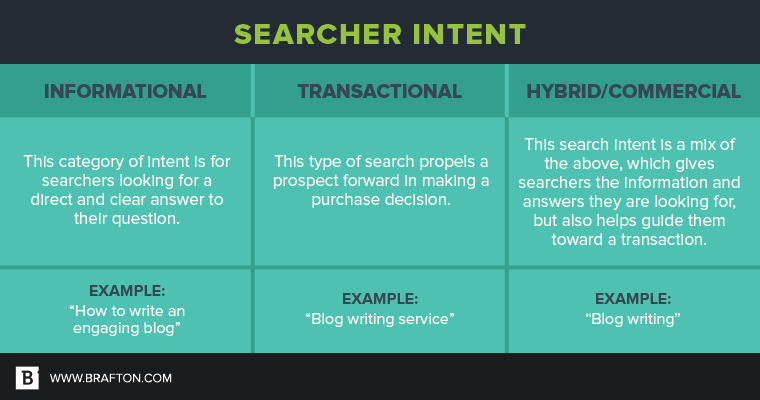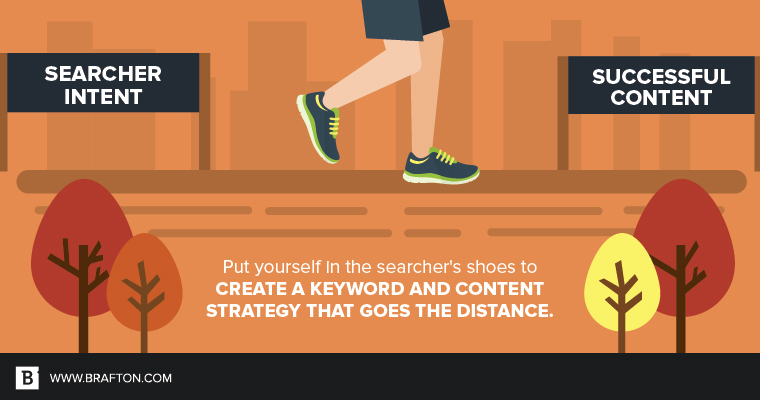Buyer personas. Keyword optimization. The content funnel.
These are just a few things that propel your content marketing strategy forward. But what actually fuels your strategy? If it’s anything other than giving your prospects exactly what they are looking for, you’re doing it wrong.
This is why searcher intent is such a crucial part of brands’ marketing efforts these days. If your keyword and content strategy is not based on what your target audience is searching for online, you stand no chance at converting them. Simple as that.

What many marketers struggle with is not only utilizing searcher intent to inform their keyword research process, but then developing content that effectively answers those search queries. In today’s content marketing climate, the power lies in the hands (or fingertips) of prospects. Companies must put themselves in a searcher’s shoes to find out what their problems are and why they are searching for a particular solution.
Finding out the ‘why’ behind intent
It’s important to keep in mind that not all searchers are the same. Your prospects are at various stages of the search process, and their issues are just as different as they are from each other.
So let’s break intent down into categories of why people are searching, which can provide simplicity when working with hundreds of keywords.

Knowing the “why” behind a search is vital for creating content that answers your prospects’ questions, but to achieve that, you’ve got to ensure you’re effectively using the right intent-based keywords.
Keywords for key content
When developing a keyword strategy, start by identifying which search intent category you want to aim for. Do you want to craft content that directly answers a question or issue? Then go with “Informational.” How about content that leads prospects further down the path to completing a transaction? Focus on “Transactional.” Whatever the intent, you’ve got to start with that foundation in order to generate the keywords that will speak directly to your visitors.
“There are several resources you can use to create a successful keyword strategy based on search intent,” says Brafton Director of Digital Marketing Strategy Jeff Baker. “These tools are essential and irreplaceable.”
Jeff relies on Google Analytics synced with Search Console for determining current performance, and research tools such as Keyword Planner, Keyword Explorer and/or SEMRUSH for evaluating organic difficulty, search volume and SERP crowding.
Hitting the intent target
Now that you’re armed with your keywords, the next step is to start creating your content. Just like you did with your keywords, begin by determining which category your content falls under.
Next, pinpoint where your target audience is in the sales funnel. Knowing their position not only helps you craft content that gives them exactly what they are looking for, but it also guides you at developing the right kind of content, whether it’s a whitepaper, landing page, blog or other piece.

Here’s an example: This page on Brafton’s website ranked No. 1 for the term “content marketing consulting.” That’s a great sign, right? Well, kind of.
When Jeff dug a little further, he found out that while the page had a great ranking and lots of impressions, there were no transactions or commercial value coming from it. So what’s the deal?
“The deal is that someone searching ‘content marketing consulting’ has a ‘Commercial’ intent,” Jeff explains. “They are further down the funnel than what this page provides. This page provides ‘Informational’ intent. This page fails because it does not provide quality content for the intent of this search.”
Basically, we got lucky by ranking so high for a certain keyword. But that luck isn’t going to – and has not – bring in any commercial value if we’re not answering the intent behind your prospects’ searches. So we’ve got to review and revise to ensure we nail down the intent.
Brands no longer dictate what the conversation is about. As content marketing continues to evolve, prospects will increasingly lead the way in terms of creating those conversations. By putting yourself in your searchers’ shoes and discovering their intent, you will be able to develop a content strategy that can go the distance.





